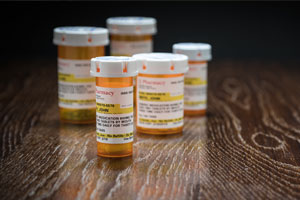
The Opioid Crisis: Why Women Are at Greater Risk
In 2016, there were 1,762 opioid-related overdose deaths in Michigan, higher than the national rate, according to the National Institute of Drug Abuse.
“Although people are prescribed pain medication for their physical pain, opioids are extremely unique,” says Dr. Robert C. Levine, medical director at HAP. “When you reach into the bottle, the pill works whether your pain is physical, emotional or both.”
Everyone has a different reaction to how strongly they feel pain. Physicians also have a difficult time determining someone’s pain, he says.
Opioids block certain pain receptors in the brain which trigger endorphins, which are hormones that reduce the perception of pain and make you feel good. When the pill wears off, you want more of those good feelings. And over time, the body builds resistance and needs a higher dosage to create the same feelings. What started as a real need to cope with pain can turn into addiction. Add to that a mood disorder like depression, and the risk for addiction goes up.
Why are women at greater risk?
According to the National Institutes of Health, it takes less time for women to become addicted than men. And they can suffer more serious emotional and physical consequences of drug use. They also are less likely to seek treatment.
Women have a greater response to chemical stimulants than men, due to their hormones, according to an article published in “The Lancet” by researchers at Yale University. Women are also more likely to hoard their drugs, according to the Centers for Disease Control and Prevention. They might take one and put two away for a later date, where men will more likely take medicine until it’s gone.
Women have higher rates of mood disorders and anxiety, according to the World Health Organization.
Women who use drugs during or after pregnancy can be afraid to seek treatment because of legal and social reasons, according to the National Institute on Drug Abuse.
Broad use of opioids
“I’ve been practicing for 28 years, so I’ve seen the ramp up and the changes that have occurred gradually over the last 15 years regarding the widespread use of opioids,” says Dr. Levine. “The responsibility is shared between the physicians who have prescribed and the patients who have requested a quick fix for their conditions. It’s been gradual, followed by a rapid increase on a reliance for a pill for every problem.”
It’s not just an issue in Michigan. According to the Centers for Disease Control and Prevention, deaths from prescription opioids – drugs that include oxycodone, hydrocodone and methadone – were five times higher nationwide in 2016 than in 1999.
“The crisis is really in the numbers and the widespread use and accessibility of opioids. You can still go online and order the drugs from illegal pharmacies,” he says.* “The drugs are more dangerous today than ever before because they’re being made in foreign countries, are unregulated and are being smuggled into the U.S.,” says Dr. Levine.
Getting help
If you’re concerned you or a family member has a problem, it’s never too late to reach out for support. The first step is acknowledging you have a problem. Then, tell someone who can help you. It can be a priest, a rabbi, a doctor, a friend, or even your health insurance provider.
“All HAP members have access to behavioral health. Our providers are trained and know how to get you the assistance you need,” says Dr. Levine. “Your health plan is prepared to help you.”
![]()
HAP has behavioral health specialists and others that can help you get off opiates if you have been relying on them for a long time. HAP members can reach our Coordinated Behavioral Health Management team Monday through Friday from 8 a.m. to 5 p.m. at (800) 444-5755. If you call outside our regular hours, leave a message and one of our specialists will call you.
Check out other related posts:
Michigan’s New Opioid Laws: How They Affect Patients and Doctors
Learn how the new opioid laws affect how doctors prescribe medications and what it could mean for you and your family.
Opioids: What They Are, Why They’re a Problem and How to Fight the Epidemic
Dr. Robert Levine answers your questions about opioid use and abuse.
*(Editor’s note: Buying opioids online is illegal.)
Sources used:
https://www.cdc.gov/drugoverdose/opioids/prescribed.html
https://www.cdc.gov/drugoverdose/data/index.html https://www.cdc.gov/drugoverdose/epidemic/index.html
https://www.drugabuse.gov/drugs-abuse/opioids/opioid-summaries-by-state/michigan-opioid-summary
https://www.ncbi.nlm.nih.gov/pmc/articles/PMC3164783/
https://www.drugabuse.gov/publications/drugfacts/substance-use-in-women
http://www.who.int/mental_health/prevention/genderwomen/en/
https://www.womenshealth.gov/files/documents/final-report-opioid-508.pdf
https://www.cdc.gov/vitalsigns/prescriptionpainkilleroverdoses/index.html
https://news.yale.edu/2018/07/05/opioid-epidemic-responses-overlook-gender
https://www.thelancet.com/journals/lancet/article/PIIS0140-6736(18)31203-0/fulltext
Categories: Get Healthy
Tags: Blog


